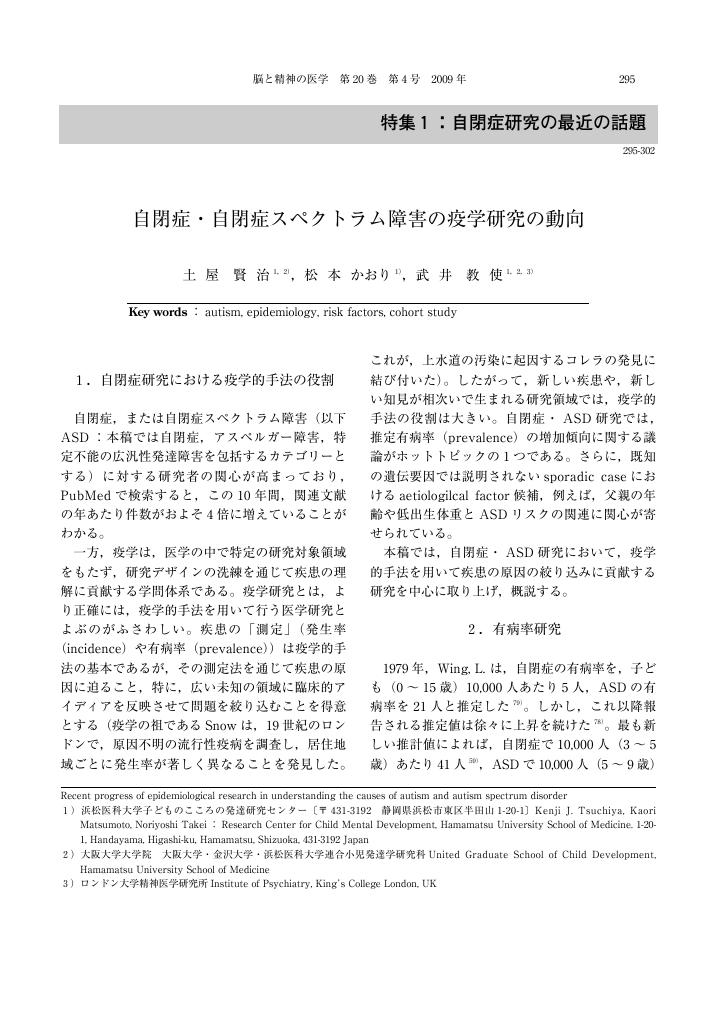21 0 0 0 OA 肯定的・否定的養育行動尺度の開発:因子構造および構成概念妥当性の検証
- 著者
- 伊藤 大幸 中島 俊思 望月 直人 高柳 伸哉 田中 善大 松本 かおり 大嶽 さと子 原田 新 野田 航 辻井 正次
- 出版者
- 一般社団法人 日本発達心理学会
- 雑誌
- 発達心理学研究 (ISSN:09159029)
- 巻号頁・発行日
- vol.25, no.3, pp.221-231, 2014 (Released:2016-09-20)
- 参考文献数
- 26
- 被引用文献数
- 3
本研究では,既存の尺度の因子構造やメタ分析の知見に基づき,養育行動を構成する7因子(関与,肯定的応答性,見守り,意思の尊重,過干渉,非一貫性,厳しい叱責・体罰)を同定し,これらを包括的に評価しうる尺度の開発を試みた。小学1年生から中学3年生までの7,208名の大規模データに基づく確認的因子分析の結果,7因子のうち「関与」と「見守り」の2因子を統合した6因子構造が支持され,当初想定された養育行動の下位概念をおおむね独立に評価しうることが示唆された。また,これらの6因子が,子ども中心の養育行動である「肯定的養育」と親中心の養育行動である「否定的養育」の2つの二次因子によって規定されるという二次因子モデルは,専門家の分類に基づくモデルや二次因子を想定しない一次因子モデルに比べ,適合度と倹約性の観点で優れていることが示された。子どもの向社会的行動や内在化・外在化問題との関連を検討した結果,「肯定的養育」やその下位尺度は向社会的行動や外在化問題と,「否定的養育」やその下位尺度は内在化問題や外在化問題と相対的に強い相関を示すという,先行研究の知見と一致する結果が得られ,各上位尺度・下位尺度の構成概念妥当性が確認された。
20 0 0 0 OA 自閉症・自閉症スペクトラム障害の疫学研究の動向
- 著者
- 土屋 賢治 松本 かおり 武井 教使
- 出版者
- 日本生物学的精神医学会
- 雑誌
- 脳と精神の医学 (ISSN:09157328)
- 巻号頁・発行日
- vol.20, no.4, pp.295-302, 2009-12-25 (Released:2011-02-02)
- 参考文献数
- 81
- 被引用文献数
- 3
5 0 0 0 OA 出生時の父親の年齢と自閉症関連疾患発症リスクとの関連~その生物学的基盤の解明~
背景と目的自閉症スペクトラム障害(ASD)の危険因子として父親の高年齢が指摘されている。今年度の本研究では、父親の高年齢が児の認知発達にどのような影響を与えるかについて、本研究では、父親の年齢という非遺伝的要因の発症への寄与を、関連因子の評価を交えて、prospectiveおよびretrospective二つの方向を交えた疫学的探索的研究を行った。方法(1)Retrospective研究:自閉症・アスペルガー障害または特定不能の広汎性発達障害(ASD)と診断され総IQが70以上の84名(5~27歳、女性14名)、精神科診断を持たない208名(5~34歳,女性104名)から、臨床情報を取得するとともに、母子手帳を通じて両親の生年月日を確認し、出生時の父親・母親の年齢とASD診断との統計学的関連をロジスティック回帰分析を用いて検討した。(2)Prospective研究:浜松医科大学医学部附属病院産婦人科(静岡県浜松市東区)および加藤産婦人科(静岡県浜松市浜北区)の2病院を2007年11月19日より2009年7月1日までに妊婦検診を目的に受診し、研究への参加の同意が得られた全妊婦780名と、その妊婦より出生した児809名を対象とした。この児を最長3年3ヶ月追跡し、Mullen Scales of Early Learningを用いて、運動発達および認知発達(視覚受容、微細運動、受容言語、表出言語)を3~4ケ月ごとに繰り返し測定した。また、父親の年齢と関連する生物学的要因として、生殖補助医療に関するデータを収集し、関連を解析した。結果とまとめ(1)出生時の父親の年齢が高いほど、児のASD診断のリスクが高いことが示された。母親の年齢には同様の関連は見られなかった。出生時の父親の年齢とASD診断のリスクとの関連の強さは、母親の年齢や出生順位、性別、自身の年齢を考慮に入れても変わらなかった。(2)粗大運動、視覚受容、微細運動、表出言語の発達、発達指標の到達、ASD疑い診断に、出生時の父親の年齢は統計学的に有意な関連をしていなかった。しかし、生殖補助医療の有無(なし、IVF、ICSI)は、いずれの発達変数においても、なし-IVF-ICSIの順に発達が遅れる傾向が認められた。欠損値に対する配慮からStructural equation modelingによって解析を進めたが、サンプル数の限界のため、父親の年齢と生殖補助医療の交互作用については言及できなかった。結論父親の年齢とASD発症リスクの生物学的基盤としての生殖補助医療の関与を確定することはできなかった。しかし、その可能性が示唆されるデータが一部から得られた。
1 0 0 0 OA 現代ロシア社会の職業評定基準 ―モスクワとウラジオストクの若年層に対する調査から―
- 著者
- 松本 かおり
- 出版者
- ロシア・東欧学会
- 雑誌
- ロシア・東欧研究 (ISSN:13486497)
- 巻号頁・発行日
- vol.2003, no.32, pp.131-144, 2003 (Released:2010-05-31)
This paper aims to compare students in Vladivostok and Moscow, Russia and examine the differences between desirability of occupation and occupational prestige by analyzing answers to questionnaires.At present, it is very difficult for Russian youths to find employment. After the demise of the Soviet Union, it became difficult for them to acquire even basic skills and gain experience through on-the-job training, the traditional way of acquiring know-how for Soviet workers. Even if they do find jobs, these are often unrelated to their majors and/or specialties in the higher education institutions. It should also be noted that premature death rate of youths has escalated in recent years. Therefore, it is wrong to assume that the social life condition of Russian youths is significantly better than others. It is in this context that this research on occupational evaluations is conducted.The result of our comparative research demonstrates some differences in occupational evaluations between Vladivostok and Moscow. In terms of desirability of occupation, Vladivostok youths consider job attractiveness, income, school education, knowledge and skills, while Moscow youths are interested in job attractiveness, creativity, and pride. Meanwhile, occupational prestige is characterized in terms of higher income, stable social life, school education, knowledge, skills and social network in Vladivostok, and higher income, stable social life, and influence on society in Moscow. It concludes by suggesting that Vladivostok is a kind of “education-conscious society” where students value diligence, while Moscow is a kind of “authority-oriented society”, where knack and intelligence are more important than Vladivostok.The research also reveals that students in both cities values job attractiveness most, not easy jobs and long leisure time. As mentioned above, however, there is little chance in reality to find jobs that satisfy them. It is obvious that there is a structural gap in the Russian labor market resulting from inefficient vocational education in the higher education institutions and the so-called “educational inflation”, a situation where even higher degrees will not guarantee these jobs. Taking all things into consideration, we have to analyze the Russian labor market further with respect to various changes taking place in this country.
1 0 0 0 小学高学年・中学生用反応スタイル尺度の開発
- 著者
- 村山 恭朗 伊藤 大幸 高柳 伸哉 松本 かおり 田中 善大 野田 航 望月 直人 中島 俊思 辻井 正次
- 出版者
- 一般社団法人 日本発達心理学会
- 雑誌
- 発達心理学研究 (ISSN:09159029)
- 巻号頁・発行日
- vol.25, no.4, pp.477-488, 2014
反応スタイルは抑うつの維持もしくは悪化を引き起こす要因である。本研究は小学4年生から中学3年生の5,217名を対象とし小学高学年・中学生用反応スタイル尺度を開発することを目的とした。既存の反応スタイル尺度を参考に,「反すう」,「問題解決」,「思考逃避」,「気晴らし」の4因子を想定した原案16項目を作成した。探索的因子分析の結果,想定された通り小学高学年・中学生用反応スタイル尺度は4因子(「反すう」,「問題解決」,「思考逃避」,「気晴らし」)で構成されることが示された。さらに各因子間に認められた相関は先行研究の知見に沿うものであった。また信頼性に関して,各下位尺度のα係数は概ね基準以上の値であることが確認された。外在基準とした抑うつおよび攻撃性との相関を検討したところ,「反すう」は正の相関,「問題解決」および「気晴らし」は負の相関を示した。これらの結果は先行研究に沿うものであり,小学高学年・中学生用反応スタイル尺度の構成概念妥当性が確認された。
1 0 0 0 ASSQ日本語版の心理測定学的特性の検証と短縮版の開発
- 著者
- 伊藤 大幸 松本 かおり 髙柳 伸哉 原田 新 大嶽 さと子 望月 直人 中島 俊思 野田 航 田中 善大 辻井 正次
- 出版者
- The Japanese Psychological Association
- 雑誌
- 心理学研究 (ISSN:00215236)
- 巻号頁・発行日
- vol.85, no.3, pp.304-312, 2014
- 被引用文献数
- 13
We examined the psychometric properties of the Japanese version of the Autism Spectrum Screening Questionnaire (ASSQ) and developed a short-form. This study included 157 children with autism spectrum disorders (ASD, ages 7–18, 128 boys) and 4,101 healthy controls (ages 7–15, 3,344 boys) from a general population with a controlled male-female ratio. Four factors (Unusual Interests, Sociality, Peer Relations, and Repetitive Behaviors) were extracted by exploratory factor analysis of control group data. Confirmatory factor analysis revealed that the 4-factor model fit well with data for another sample of the control and ASD groups. Logistic analysis showed that the former 3 factors could significantly predict ASD diagnosis. Thus, a short form of the ASSQ was developed, consisting of 11 items for these 3 factors. This short form showed sufficient internal consistency and high discrimination power for ASD diagnosis that was comparable to that of the 22-item version. Receiver operating characteristic analysis indicated an optimal cut-off of 7 for the 22-item version (sensitivity .949, specificity .801) and 5 for the short-form (sensitivity .936, specificity .818).
- 著者
- 橋本 温 河井 健作 西崎 綾 松本 かおり 平田 強
- 出版者
- 公益社団法人 日本水環境学会
- 雑誌
- 水環境学会誌 = Journal of Japan Society on Water Environment (ISSN:09168958)
- 巻号頁・発行日
- vol.22, no.4, pp.282-287, 1999-04
- 被引用文献数
- 5
In order to investigate the occurrence and indicator of protozoa in water, water samples were collected from 11 points along the Sagami River and its tributaries for 9 months. The concentrations of Cryptosporidiurn oocysts, Giardia cysts and potential indicators (presumptive Clostridium perfringens spores, Escherichia coli, coliforms, aerobic spores and turbidity) were analyzed. Cryptosporidium oocysts were detected at 10 of the 11 sampling points (GM 34 presumptive oocysts·100l-1, 24 confirmed oocysts·100l-1) and Giardia cysts were detected at all sampling points (GM 30 presumptive cysts·100l-1, 12 confirmed cysts·100l-1). Based on a regression analysis, the concentrations of presumptive C.perfringens spores and E.coli were significantly correlated with the concentrations of protozoa. In a multiple regression analysis, the concentration of presumptive C.perfringens spores, E.coli and aerobic spores were selected as explanatory variables for the protozoan concentrations. The results indicated that presumptive C.perfringens spores, aerobic spores and E.coli were useful indicators for protozoan contamination.
